Part 3: School of Pharmacy alumni who shaped the profession as presidents of AAPS and AIHP
By Katie Ginder-Vogel
As we conclude our three-part series featuring the University of Wisconsin–Madison School of Pharmacy alumni who have led of some of the country’s most prestigious national pharmacy leadership organizations and their impact on the field of pharmacy, we spotlight alums who have served as presidents of research-oriented groups: the American Association of Pharmaceutical Scientists and the American Institute of the History of Pharmacy.
The American Association of Pharmaceutical Scientists (AAPS)
- 1985, Arthur Mlodozeniec
- 1987, Boyd Poulsen
- 1989, James Tingstad
- 1992, Joseph Robinson
- 1993, Thomas F. Patton
- 1994, Anthony Sinkula
- 1996, Vincent H L Lee
- 2001, Ronald Borchardt
- 2007, Eugene Fiese
The American Association of Pharmaceutical Scientists was spun out of the Academy of Pharmaceutical Sciences, when a group of academic leaders in the pharmaceutical sciences and industrial scientists — several of whom were School of Pharmacy alumni — felt they needed a professional organization more focused on research scientists. Arthur Mlodozeniec (PhD ’64) served as AAPS’ first president, in 1985.
Mlodozeniec’s physical chemistry expertise included pre-formulation, early stage product development, manufacturing, quality control, quality assurance, and quality management, and he was later inducted as a fellow of the AAPS and led many AAPS scientific symposia and committees. He taught at multiple universities — including Long Island University, University of California Berkeley, and others — and also spent many years in the biotechnology industry in companies such as Upjohn, Merck, and Syntex.
Boyd Poulsen (PhD ’63) became the first elected AAPS president in 1987. Poulson was a PhD student in former School of Pharmacy Dean August Lemberger’s research group before becoming a vice president at Syntex Pharmaceutical Company, where he spent 30 years and retired as executive vice president of pharmaceutical research and development.
Poulsen was also an adjunct professor at the University of the Pacific and Oregon State University and was a board member, chairman of the board, and consultant to many pharmaceutical companies. For his myriad contributions to the field, he was honored with a Citation of Merit from the School of Pharmacy in 1985.
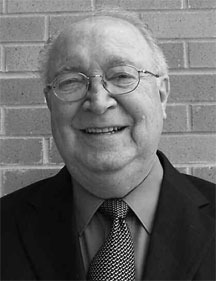
Another Citation of Merit winner with a distinguished career in the pharmaceutical industry, James Tingstad (BS ’53, MS ’55, PhD ’57), took over in 1989. He held positions at the Upjohn Company, the University of California San Francisco School of Pharmacy, 3M Company-Riker Laboratories, and Abbott Laboratories. Throughout his career, he was active in several national professional associations for pharmacists and pharmaceutical research, including his role as AAPS president.
Joseph Robinson (PhD ’66) was the Kremers Professor of Pharmacy in the School of Pharmacy and professor of ophthalmology in the UW–Madison, and his students Thomas Patton and Vincent Lee also served as AAPS presidents. Robinson earned BS and MS degrees at Columbia University in 1961 and 1963 respectively, and professors Takeru Higuchi and George Zografi, who later served as dean of the UW–Madison School of Pharmacy, mentored him as a student researcher.
“Joe had a major impact on research and was active in the scientific community,” says Zografi, who grew up in the same neighborhood as Robinson in New York.
AAPS awarded Robinson with its highest honor in 1999: the Distinguished Pharmaceutical Scientist award, recognizing over 30 years of Robinson’s pioneering work in the areas of ocular and oral drug disposition and controlled-release drug delivery. Robinson was one of three scientists worldwide who pioneered the use of bioadhesives in drug delivery and is credited with the discovery that polycarbophil can be used as a bioadhesive.
“I owe any success I had in my scientific career to the mentoring and friendship of professors Joe Robinson and Takeru Higuchi and my education at UW–Madison.”
—Thomas Patton
Robinson founded three successful public companies — InSite Vision, Columbia Labs, and Macromed — and his research and development of bioadhesive polymers was utilized and commercialized widely. As a professor, Robinson mentored over 90 graduate students and postdoctoral fellows, many of whom became leaders in the industrial and academic pharmaceutical sciences.
One of those mentees was Thomas F. Patton (BS ’71, MS ’73, PhD ’75), who succeeded Robinson as AAPS president in 1993. He was a founding AAPS member and served as an officer and member of the executive committee of AAPS’s predecessor organization, the Academy of Pharmaceutical Sciences.
“The formation of AAPS was a bold and contentious event. But those early years proved that the decision to form this new organization was the correct one,” he says, citing the AAPS’ explosive growth in membership.
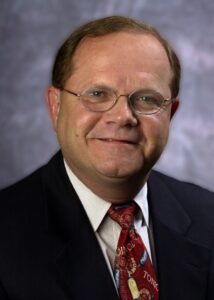
“By the time I became AAPS president in 1993, the association was beginning to mature,” Patton says. “I instituted a planning and objective-setting process within the executive council that began to pave the way for future AAPS growth and initiatives.”
Patton was a professor and associate vice chancellor at the University of Kansas from 1975 to 1986. He then spent several years in industry, working for Upjohn, Oread Laboratories, Merck, and DuPont Merck, before becoming president of the St. Louis College of Pharmacy in 1994, where he is currently president emeritus.
Patton was honored with the School of Pharmacy’s Citation of Merit in 1998 and established the Floyd E. and Alberta Patton scholarship at the School of Pharmacy to honor his parents, in hopes of aiding others to reach their higher education goals.
“My early scientific work was an extension of my graduate research, and Joe Robinson and I continued to follow each other’s work in the field of ophthalmic drug delivery,” says Patton. “I owe any success I had in my scientific career to the mentoring and friendship of professors Joe Robinson and Takeru Higuchi and my education at UW–Madison.”
Continuing the streak of leadership by School of Pharmacy alums, Anthony Sinkula (BS ’59), another founding member of AAPS, was elected president in 1994. He earned his MS and PhD in organic medicinal chemistry in 1961 at the Ohio State University and then spent 30 years at the Upjohn Company, beginning as a research scientist and moving through the ranks to director of corporate research planning. He then became vice president and chief scientific officer for West Pharmaceutical Services.
“During my four years at the School, I was exposed to new science both in the classroom and in the laboratory. Those experiences totally changed my career goals and objectives and transformed my life.”
—Ronald Borchardt
AAPS honored him with its Past Presidents award for his 30 years of dedication. He was a member of the School of Pharmacy’s Board of Visitors.
Another of Robinson’s students, Vincent H L Lee (MS ’78, PhD ’79), took the reins as AAPS president in 1996 and served as editor of the AAPS journal Pharmaceutical Research. After graduating from the School, he joined the faculty of the University of Southern California and rose in the academic ranks to become chairman of the Department of Pharmaceutical Sciences at USC in 1990.
Lee received the School of Pharmacy’s Citation of Merit in 2002, before becoming associate director of the Office of Pharmaceutical Science at the U.S. Food and Drug Administration’s Center for Drug Evaluation and Research for several years. He then returned to Hong Kong, where he had grown up, to be professor and director of the School of Pharmacy at The Chinese University of Hong Kong.
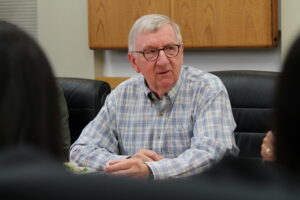
Five years later, during his tenure as AAPS president in 2001, Ronald T. Borchardt (BS ’67) wanted to help build up its excellence in scientific publishing, including journals and books.
“My efforts to produce books for AAPS started in 1992 when I agreed to be the editor of a series of books entitled Pharmaceutical Biotechnology,” he says. Over the next 16 years, this series grew to include 23 books, six of which Borchardt co-edited with other pharmaceutical scientists.
“As a member of AAPS leadership team from 2000 to 2002, I also helped the organization build up its internal portfolio of electronic scientific journals,” he says. “In addition, as editor-in-chief of APhA’s Journal of Pharmaceutical Sciences for the past 19 years, I have helped to forge and to sustain a relationship between AAPS and APhA with respect to the marketing and distribution of this journal.”
For these contributions to the profession — as well as serving as a teacher and research mentor at the University of Kansas-Lawrence (KU) over the past 50 years — he’s received numerous awards and accolades: a 1989 Citation of Merit from the School of Pharmacy, 1997 AAPS Distinguished Pharmaceutical Scientist award, 1998 American Academy of Colleges of Pharmacy Volwiler Research Achievement award, 1999 International Pharmaceutical Federation Host-Madsen Medal, 2003 APhA Takeru Higuchi Research Award, 2003 American Chemical Society Edward E. Smissman award, and three campus-wide teaching awards at KU.
“I came to UW–Madison from Northern Wisconsin to be trained as a pharmacist. During my four years at the School, I was exposed to new science both in the classroom and in the laboratory,” says Borchardt. “Those experiences totally changed my career goals and objectives and transformed my life.”
To offer the School’s current PharmD students the same transformative experience, he and his wife established the Ronald T. and Pamela K. Borchardt Pharmaceutical Sciences Scholarships and Awards, which support PharmD students participating in research.
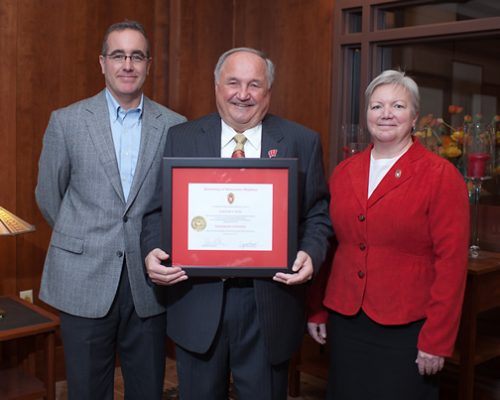
In his continual pursuit to further the education of young researchers, in 1996 he founded a not-for profit organization called Globalization of Pharmaceutics Education Network (GPEN, Inc.), which fosters and facilitates international scientific exchange in the pharmaceutical sciences through its biennial meeting and sponsorship of graduate student exchanges between member institutions. Over the past 24 years GPEN has grown to a global network of 55 universities, including the UW–Madison School of Pharmacy.
Our most recent alumni AAPS president is one of Borchardt’s former classmates: Eugene Fiese (BS ’67, MS ’68), with a 2007 tenure. He spent 30 years at Pfizer, retiring in 2004 as an associate research fellow in the General Pharmaceutics Group, Pharmaceutical Research and Development at Pfizer. In that role, Fiese managed a group that assessed the physical chemical properties of potential drug candidates and led optimization for the development of solid, parenteral, and aerosol dosage forms. His technical expertise includes analytical chemistry, solid-state chemistry, drug absorption, and formulation development.
Fiese, a 2011 Citation of Merit honoree, has served as an advisor to the Board of the Lenor Zeeh Pharmaceutical Experiment Station at the School of Pharmacy and a short-course instructor for School’s Division of Pharmacy Professional Development.
The American Institute of the History of Pharmacy (AIHP)
- 1941–1955, Arthur Uhl
- 1967–1969, Alex Berman
- 1969–1971, Norman Franke
- 1977–1979, Ernst Stieb
- 1979–1981, Sami Hamarneh
- 1983–85, Robert Buerki
- 1991–93 & 2013–19, William Zellmer
- 1999–2001 & 2007–13, John Swann
- 2001–03, Michael Harris
The American Institute for the History of Pharmacy (AIHP) was founded at the UW–Madison School of Pharmacy in 1941. It has been housed in the School since its founding, and the two organizations share a close relationship. For more than half of AIHP’s existence, 37 years, a School of Pharmacy alum has led the organization as president.
“AIHP is called an institute, but really it’s a historical society for American pharmacists,” says Greg Higby (MS ’80, PhD ’84), senior academic curator with the AIHP and senior lecturer at the School of Pharmacy, who served as AIHP executive director until 2018. “AIHP houses book archival collections, publishes a journal, hosts meetings and conferences, and funds research through grants.”
“AIHP controls and augments the world’s largest pharmaceutical history collection and has had influence on scholarship on the history of medicine and pharmacy,” says Zografi. “It’s the center for pharmaceutical historical info and continues to be to this day, so anybody active in AIHP as president had to make major decisions.”
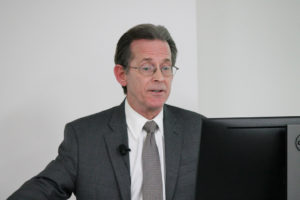
Five of the six founders — Arthur Uhl (BS ’21, MS ’27, PhD ’30), Edward Kremers (PhG 1886, BS 1888), Louis Busse (BS ’36, PhD ’40), and Lloyd Parks — were professors at the School of Pharmacy. Jennings Murphy, secretary of the Wisconsin Pharmaceutical Association, and George Urdang, former director of the German Society of the History of Pharmacy, also helped create AIHP.
“Edward Kremers was a real history buff and collected tons of historical information and set the stage for the founding of AIHP,” says Zografi. Those documents are now AIHP’s Kremers Reference Files.
Uhl served as AIHP’s first president. He led the School of Pharmacy as dean for 35 years, during which time he focused on building a world-class pharmaceutical research program, recruiting academic powerhouses William Apple and Takeru Higuchi. Uhl, who was also president of the American Association of Colleges of Pharmacy, received the School’s Citation of Merit in 1971.
As with all researchers, each of these individuals brought their own area of expertise to AIHP. Alex Berman (MS ’51), professor emeritus of history and of historical studies in pharmacy at the University of Cincinnati, specialized in the history of French pharmacy and received the Edward Kremers award for excellence in the history of pharmacy from AIHP in 1963. Norman Franke (MS ‘52, PhD ’56), wrote about Civil War-era pharmacy and taught at the Auburn University School of Pharmacy, the University of Kentucky College of Pharmacy, and Mercer University’s Southern School of Pharmacy.
Ernst Stieb (PhD ’59), whose research focused on the adulteration of drugs, joined the School of Pharmacy faculty after earning his PhD, and for several years held a joint appointment with AIHP. Later, Stieb returned to Canada to teach history of pharmacy at the University of Toronto, where he had an appointment in the Institute for the History and Philosophy of Science and Technology.
Stieb, who received AIHP’s Edward Kremers award in 1967, helped found the Canadian Academy of the History of Pharmacy in 1968 and was executive director from until 1995. In 1971, he was appointed curator of the Niagara Apothecary Museum in Niagara-on-the-Lake, Ontario, where he continued to be involved even after his retirement from the University of Toronto.
Sami Hamarneh PhD ’59), a 1966 recipient of the AIHP Edward Kremers award and 1997 Citation of Merit honoree, was a historian of Islamic medicine and worked as a supervisor and curator in the Division of Medical Sciences at the Smithsonian Institution.
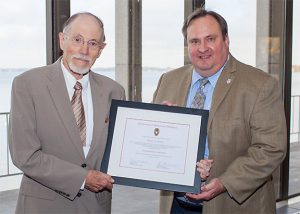
Another Citation of Merit recipient, Robert Buerki (BS ‘63, MS ’67), who was also a president of Rho Chi, the pharmacy honor society, became president of AIHP in 1983. is an emeritus professor at the Ohio State University College of Pharmacy. Buerki, an expert on pharmacy ethics, collaborated with the AIHP on an updated history of Rho Chi in the 1990s and continues to serve as AIHP secretary. He received the AIHP’s Edward Kremers award in 2004 and the School of Pharmacy’s Citation of Merit in 2014.
John Swann (MS ‘82, PhD ’85), the senior historian at the U.S. Food and Drug Administration, was AIHP president for two different periods and a total of four terms, 1999–2001 and 2007–13. During Swann’s terms, the executive committee and council were working to find ways for the institute to connect more with historians who might want to do work that aligned with AIHP’s interests.
“We started the first of two or three conferences in Madison on modern medicine, to bring people in the burgeoning field of pharmaceutical studies together,” says Swann.
Swann says he enjoyed handing out AIHP awards, like the Edward Kremers awards, to honor scholars of the history of pharmacy. Swann himself was honored with an Edward Kremers award in 1989.
“The AIHP staff are really responsible for getting things done in the institute,” says Swann. “Greg Higby helped walk me through things, like how the awards committee worked, and prepped me for key issues coming up in meetings, which was so helpful.”
Between Swann’s two tenures, Michael Harris (MS ’91) took over the AIHP presidency from 2001 to 2003. Like Hamarneh, Harris worked for the Smithsonian Institution, where he was the museum specialist of the Medical Sciences Division at the Smithsonian’s Museum of American History and was known for his contributions to the Smithsonian’s wildly successful 1983 exhibit, “M*A*S*H: Binding Up the Wounds,” in which objects from the hit TV show were donated to the Smithsonian for the exhibit. Harris practiced pharmacy in New York before joining the Smithsonian.
“Knowledge of history is an essential element in developing leaders in any field, including pharmacy practice, pharmacy education, and pharmaceutical R&D.”
—William Zellmer
The most recent School of Pharmacy alum at the helm of AIHP is William Zellmer (BS ’67). Zellmer also had two tenures as president — nearly tied with Swann as longest-serving president — and has been a member since he was a student at the School of Pharmacy.
“Studying the history of pharmacy back then stimulated a lifelong interest in the Institute’s work, especially as related to the history of pharmacy practice and education,” he says. “Knowledge of history is an essential element in developing leaders in any field, including pharmacy practice, pharmacy education, and pharmaceutical R&D.”
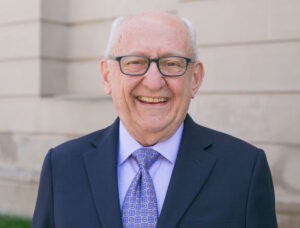
Following the 2019 retirement of Higby, who served as executive director of AIHP for 30 years, the AIHP board of directors under Zellmer’s leadership established a new arrangement for the institute’s historical and administrative functions. The School of Pharmacy created the George Urdang Chair in the History of Pharmacy to serve as AIHP’s historical director and a faculty member in the School’s Social and Administrative Sciences Division, which went to Associate Professor Lucas Richert. The role of AIHP’s executive director, currently held by Dennis Birke, was redefined to concentrate on administrative, planning, and membership development activities.
Zellmer, a 1990 Citation of Merit winner, says he’s also proud of his board’s success in gaining support for AIHP from other national pharmacist organizations.
“We were successful in raising the profile of AIHP among national pharmacist organizations, which was very gratifying to me,” says Zellmer, who also served as deputy executive vice president of the American Society of Health-System Pharmacists (ASHP). “We now are invited observers at the quarterly joint meetings of all the national associations of pharmacists. Significantly, six of those organizations are now financial supporters of AIHP.”
As a student at the School, Zellmer was editor of a student publication and was active in student organizations, which spurred his interest in advancing the profession of pharmacy though organizational work. This drive propelled him to seek out his roles in both ASHP and AIHP.
“I believe that the work of AIHP in preserving, analyzing, and communicating pharmacy history should become a stronger component of leadership development in the profession,” Zellmer adds. “For that reason, it has been, and continues to be, important to me to support the work of AIHP in any way I can.”